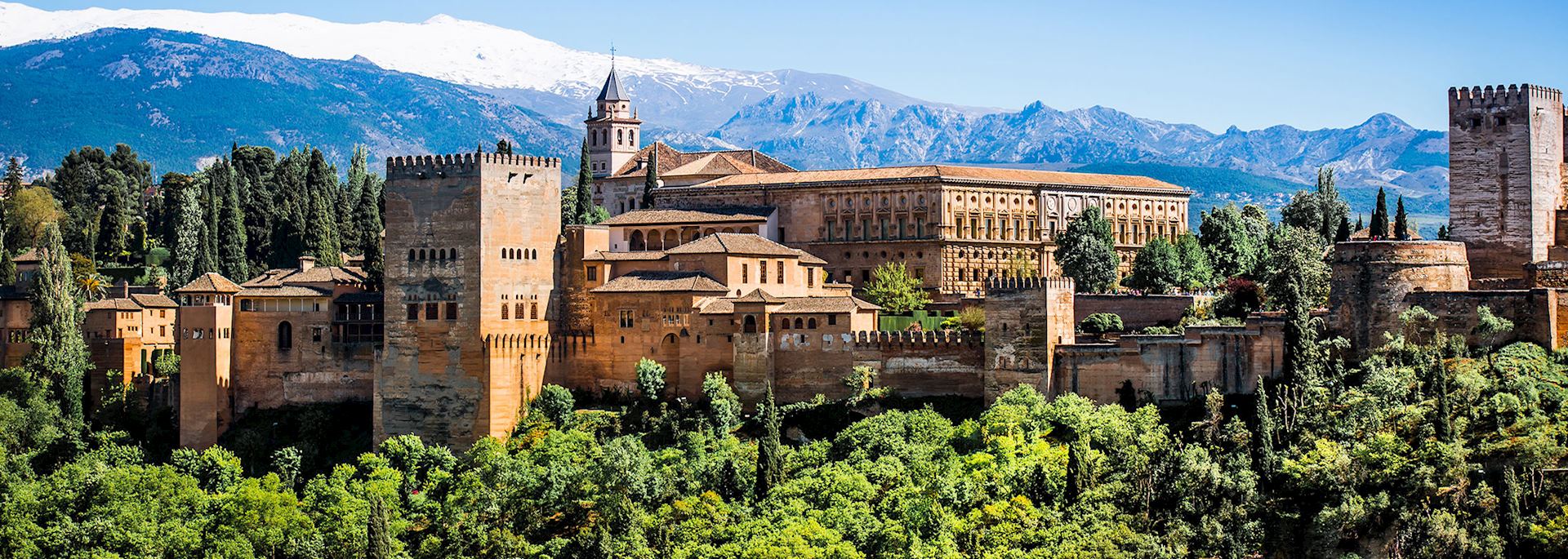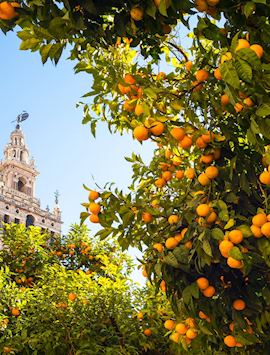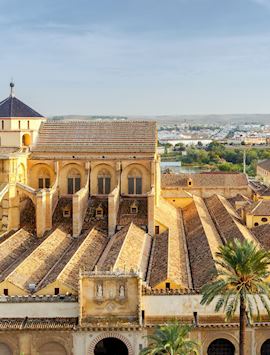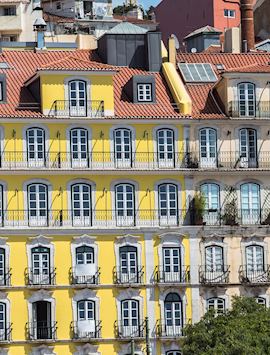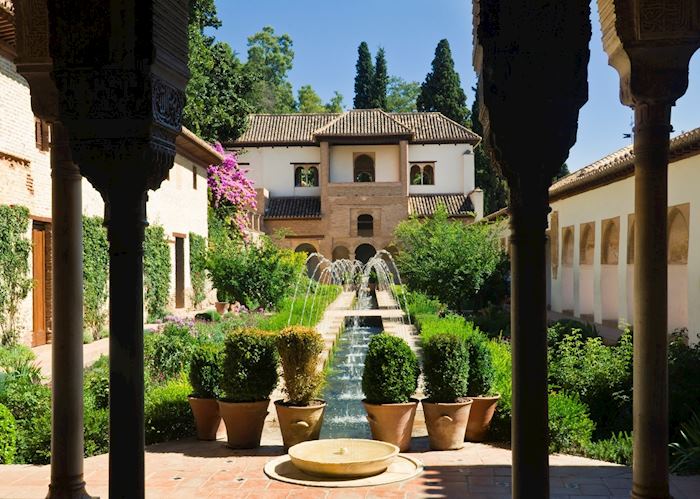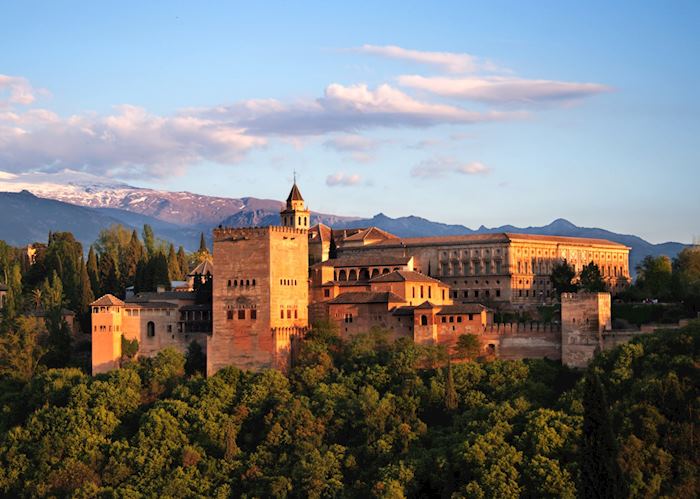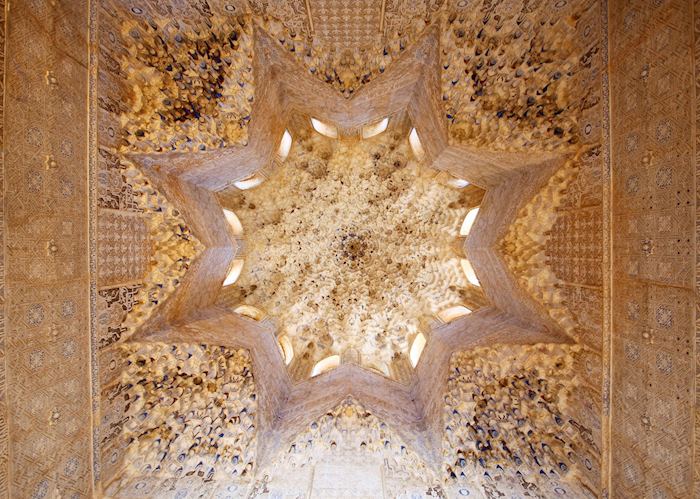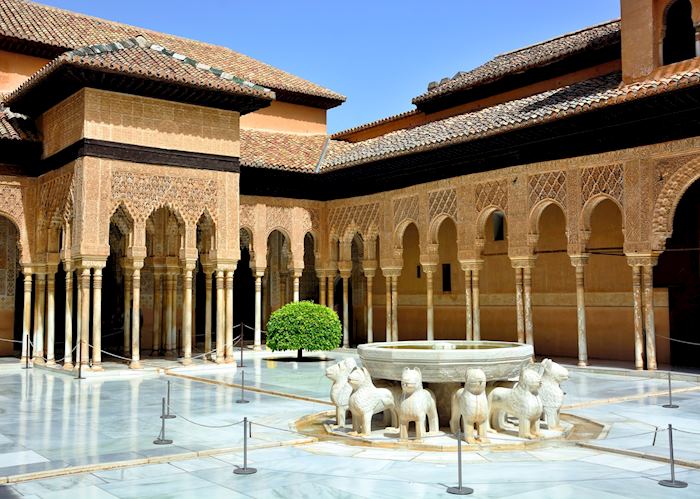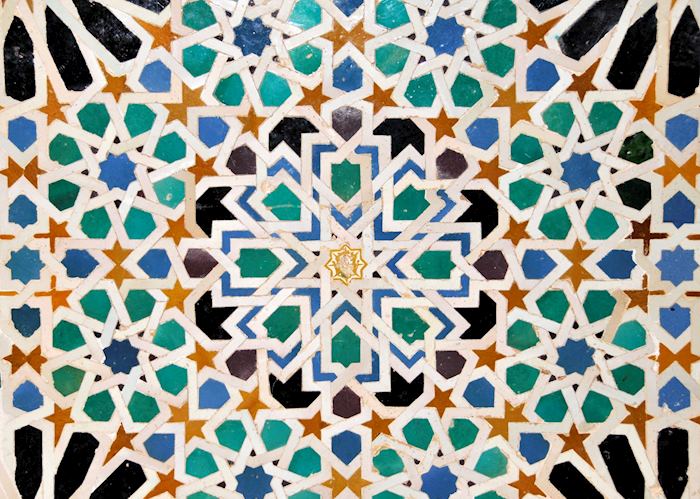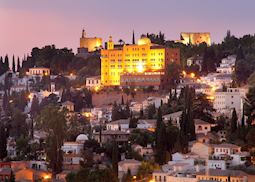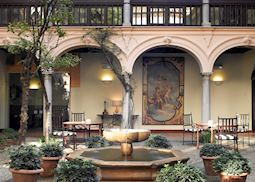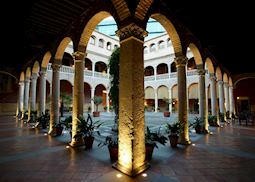Jump to:
Set against a backdrop of the Sierra Nevada, Granada is best known as the home of the Alhambra, the elaborate Moorish palace complex that dominates the city. It was once the seat of the powerful Nasrid dynasty, whose influence you can still see in the medieval streets where the Arab bathhouses, horseshoe arches and winding lanes are more reminiscent of North Africa than Europe. Spanish monarchs Ferdinand and Isabella are buried in the gilded Capilla Real de Granada (Royal Chapel), while coffee shops, galleries, tapas bars and performance spaces cluster along the lanes, many in converted caves.
Spain & Portugal specialist SarahOf course, the Alhambra is amazing. But, I also enjoy the small-town feel of the Albayzin, the old Arab quarter, with its narrow streets and views of the river before you walk up the hill to the fortress.
Things to see and do in Granada
Alhambra Palace
'A rugged fortress without, a voluptuous palace within; war frowning from its battlements; poetry breathing throughout the fairy architecture of its halls,’ was how Washington Irving described the Alhambra, his brief home in 1829. Considered the finest Islamic buildings in Europe, the 14th-century fortified palaces of the Alhambra sit on three hills overlooking Granada.
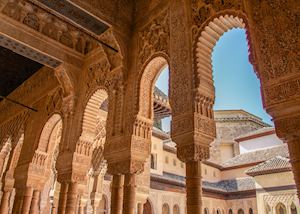 The Moorish complex was home to Granada’s Nasrid emirs and features a series of grand rooms, baths, courtyards and gardens decorated with mosaics, stucco and woodwork, and pools and fountains.
The Moorish complex was home to Granada’s Nasrid emirs and features a series of grand rooms, baths, courtyards and gardens decorated with mosaics, stucco and woodwork, and pools and fountains.
Water was diverted from a river 8 km (5 miles) away to make the former alcazaba, an 11th-century fortress, inhabitable, and work began to transform it into one of the most serene, impressive and modern palace complexes of its day.
In the 16th century, Charles V had a wing of rooms demolished to build his own Renaissance palace, while in the early 19th century Napoleon’s forces looted and destroyed another section of palace but were thwarted in their plot to blow up the whole site. What remains is an indication of the engineering prowess, master craftsmanship and creative imagination of the emirs and their architects.
The Court of the Lions
The Alhambra’s finest rooms are in the Palacio de los Leones, a private area for the royal family and harem, which radiates out from the central Patio de los Leones, or Court of the Lions. Decorated with repetitive geometric designs, the courtyard is enclosed by ornamented pavilions supported by 124 slender white-marble columns.
They surround an 11th-century alabaster fountain set on top of 12 carved marble lions representing the 12 tribes of Israel. Four water channels spread out from the fountain, symbols of the four rivers of paradise, and lead to the exquisitely decorated surrounding rooms. The courtyard was originally planted but is now covered with pebbles after worries over the state of the pavilion foundations.
Generalife
The sultan’s summer palace, the Generalife was constructed in the 14th century and is one of the most tranquil parts of the Alhambra complex. Its courtyard gardens, patios and walkways balance lush planting with fountains and pools, with trees providing shade and the spray of water cooling the surrounding air.
Low windows in the buildings allowed those sitting on the floor indoors, as was customary, to see the gardens. In the courtyards, the horseshoe arches of the buildings are reflected in the still water of the pools, while rows of fountains flank the flowerbeds in the Court of the Water Channel. You’ll also see the Courtyard of the Cypress with its sculpted junipers and the Water Staircase, which is flanked by channels of gushing water and looks down onto the Albayzin, the old Arab quarter of the city.
Albayzin, the old Arab quarter
Granada’s medieval Moorish quarter, the Albayzin, is a warren of narrow cobbled streets and small squares that blanket a hill facing the Alhambra. It’s an atmospheric area full of small shops, tapas bars and tea houses. In its heyday, there were 30 mosques here.
Although most of these were torn down and replaced by churches and convents, you can still get a feel of what the area was like as you meander past trickling fountains, old cisterns and bathhouses and whitewashed houses with bougainvillea-draped walls and balconies overflowing with geraniums.
The Mirador San Nicolás lookout point is here, and it offers views of the Alhambra with the brooding peaks of the Sierra Nevada behind. It’s particularly scenic at sunset.
Capilla Real de Granada
The final resting place of Spain’s Catholic monarchs and their children, the Royal Chapel sits in Granada’s 16th-century cathedral. Ferdinand and Isabella ended Moorish rule in Spain in 1492, and they planned a monumental mausoleum in the city that was the scene of their most significant conquest.
A gilded screen separates the chapel from the main church. Behind it lies the Gothic mausoleum, which contains two enormous Carrara marble tombs. There’s a small museum in the sacristy, which contains Ferdinand’s sword and Isabella’s scepter and crown, as well as art from their personal collection, including work by Botticelli.
Best time to visit Granada
May to June and September to October are good times to visit Granada, as the pleasantly warm weather makes it easy to explore the city on foot. In July and August, temperatures can reach 90°F (32°C). The winter months are quieter but can be much cooler within the walls of the palace.
who's been there
-
617-223-4521617-223-4767
- Make an inquiry
Suggested itineraries featuring Granada
Our itineraries will give you suggestions for what is possible when you travel in Granada, and they showcase routes we know work particularly well. Treat them as inspiration, because your trip will be created uniquely by one of our specialists.
Places near Granada
- Costa del Sol 61 miles away
- Córdoba 81 miles away
- Ronda 92 miles away
- Seville 133 miles away
- Andalusia 133 miles away
- Toledo 187 miles away
- Madrid 224 miles away
- El Escorial & Valle de los Caídos 238 miles away
- Ávila 248 miles away
- Segovia 262 miles away
- Salamanca 285 miles away
- Ibiza 299 miles away
Photos of Granada
Accommodation choices for Granada
We've selected a range of accommodation options for when you visit Granada. Our choices usually come recommended for their character, facilities and service or location. Our specialists always aim to suggest properties that match your preferences.
-
![Hotel Alhambra Palace, Granada]()
Hotel Alhambra Palace
Granada -
![Parador de Granada, Granada]()
Parador de Granada
Granada -
![Hotel Palacio de Santa Paula, Granada]()
Hotel Palacio de Santa Paula
Granada
Ideas for experiencing Granada
Our specialists seek out authentic ways to get to know the places that could feature in your trip. These activities reflect some of the experiences they've most enjoyed while visiting Granada, and which use the best local guides.
-
Alhambra Palace and Granada city tour ![Patio de los Leones, Alhambra, Granada]()
Alhambra Palace and Granada city tour
Alhambra Palace and Granada city tour
On this private guided tour of Granada, you’ll explore Spain’s history while visiting the Moorish masterpiece of the Alhambra, the Capilla Real — final resting place of Ferdinand and Isabella, and the labyrinthine Albayzin district, which remains much as it was during medieval times.
View details
